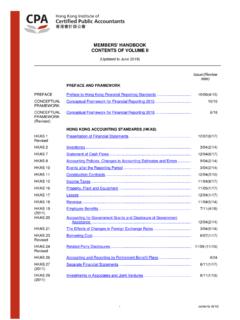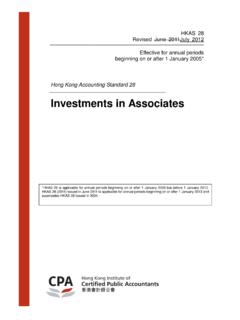Transcription of HKAS 27 Consolidated and Separate Financial …
1 April 2005 Page 1 of 10 HKAS 27 consolidated and separate financial Statements1 Nelson Lam 1. Scope of hkas 27 Hong Kong Accounting Standard (HKAS) 27 consolidated and separate financial Statements shall be applied in the preparation and presentation of Consolidated Financial statements for a group of entities under the control of a parent. ( hkas 27 para. 1)2 Consolidated Financial statements are the Financial statements of a group presented as those of a single economic entity. A group is a parent and all its subsidiaries. ( hkas 27 para. 4) hkas 27 does not deal with methods of accounting for business combinations and their effects on consolidation, including goodwill arising on a business combination; instead they are covered in Hong Kong Financial Reporting Standard (HKFRS) 3 Business Combinations. hkas 27 shall also be applied in accounting for investments in subsidiaries, jointly controlled entities and associates when an entity elects, or is required by local regulations, to present Separate Financial statements.
2 ( hkas 27 para. 3) 2. Presentation of Consolidated Financial Statements A parent, other than a parent described in section below ( paragraph 10 of hkas 27 ), shall present Consolidated Financial statements in which it consolidates its investments in subsidiaries in accordance with hkas 27 . ( hkas 27 para. 9) A parent is an entity that has one or more subsidiaries. A subsidiary is an entity, including an unincorporated entity such as a partnership, that is controlled by another entity (known as the parent). ( hkas 27 para. 4) A parent or its subsidiary may be an investor in an associate or a venturer in a jointly controlled entity. In such cases, Consolidated Financial statements prepared and presented in accordance with hkas 27 are also prepared so as to comply with HKAS 28 Investments in Associates and HKAS 31 Interests in Joint Ventures. For an entity described in the above paragraph, Separate Financial statements are those prepared and presented in addition to the Financial statements referred to in the above paragraph.
3 Separate Financial statements need not be appended to, or accompany, those statements. (See section 5 below) Exemption in hkas 27 A parent need not present Consolidated Financial statements if and only if: (a) the parent is itself a wholly-owned subsidiary, or is a partially-owned subsidiary of another entity and its other owners, including those not otherwise entitled to vote, have been informed about, and do not object to, the parent not presenting Consolidated Financial statements; 1 This note is sourced from HKAS 27 consolidated and separate financial Statements. While the note is aimed at covering all critical points of hkas 27 , a complete and comprehensive coverage should still be the original standard, hkas 27 . 2 All the paragraphs in the HKAS have equal authority now. While certain paragraphs in HKAS are highlighted in bold and italic, the same format is adopted in this note for those paragraphs.
4 April 2005 Page 2 of 10 (b) the parent s debt or equity instruments are not traded in a public market (a domestic or foreign stock exchange or an over-the-counter market, including local and regional markets); (c) the parent did not file, nor is it in the process of filing, its Financial statements with a securities commission or other regulatory organization for the purpose of issuing any class of instruments in a public market; and (d) the ultimate or any intermediate parent of the parent produces Consolidated Financial statements available for public use that comply with HKFRSs or International Financial Reporting Standards (IFRSs). ( hkas 27 para. 10) A parent that elects in accordance with the above paragraph not to present Consolidated Financial statements, and presents only Separate Financial statements, complies with the requirements set out in section 5 below (paragraphs 37-42 of hkas 27 ).
5 A parent that is exempted in accordance with this section from presenting Consolidated Financial statements may present Separate Financial statements as its only Financial statements. (See section 5 below) Exemption in the Hong Kong Companies Ordinance Section 124(2) of the Hong Kong Companies Ordinance permits a holding company not to prepare group accounts if the company is a wholly-owned subsidiary of another company at the end of its Financial year. Accordingly, a Hong Kong incorporated parent company can only take advantage of the exemption under section above ( paragraph 10 of HKAS) if it also satisfies the exemption allowed under the above section (section 124(2) of the Hong Kong Companies Ordinance). 3. Scope of Consolidated Financial Statements Consolidated Financial statements shall include all subsidiaries of the parent. ( hkas 27 para. 12) As defined above, a subsidiary is an entity, including an unincorporated entity such as a partnership, that is controlled by another entity (known as the parent).
6 Control is the power to govern the Financial and operating policies of an entity so as to obtain benefits from its activities. ( hkas 27 para. 4) If on acquisition a subsidiary meets the criteria to be classified as held for sale in accordance with HKFRS 5 Non-current Assets Held for Sale and Discontinued Operations, it shall be accounted for in accordance with that Standard. Control Control is presumed to exist when the parent owns, directly or indirectly through subsidiaries, more than half of the voting power of an entity unless, in exceptional circumstances, it can be clearly demonstrated that such ownership does not constitute control. Control also exists when the parent owns half or less of the voting power of an entity when there is: (a) power over more than half of the voting rights by virtue of an agreement with other investors; (b) power to govern the Financial and operating policies of the entity under a statute or an agreement; (c) power to appoint or remove the majority of the members of the board of directors or equivalent governing body and control of the entity is by that board or body; or (d) power to cast the majority of votes at meetings of the board of directors or equivalent governing body and control of the entity is by that board or body.
7 April 2005 Page 3 of 10 Potential voting rights An entity may own share warrants, share call options, debt or equity instruments that are convertible into ordinary shares, or other similar instruments that have the potential, if exercised or converted, to give the entity voting power or reduce another party s voting power over the Financial and operating policies of another entity (potential voting rights). The existence and effect of potential voting rights that are currently exercisable or convertible, including potential voting rights held by another entity, are considered when assessing whether an entity has the power to govern the Financial and operating policies of another entity. Potential voting rights are not currently exercisable or convertible when, for example, they cannot be exercised or converted until a future date or until the occurrence of a future event.
8 In assessing whether potential voting rights contribute to control, the entity examines all facts and circumstances (including the terms of exercise of the potential voting rights and any other contractual arrangements whether considered individually or in combination) that affect potential voting rights, except the intention of management and the Financial ability to exercise or convert. Loss of control A parent loses control when it loses the power to govern the Financial and operating policies of an investee so as to obtain benefit from its activities. The loss of control can occur with or without a change in absolute or relative ownership levels. It could occur, for example, when a subsidiary becomes subject to the control of a government, court, administrator or regulator. It could also occur as a result of a contractual agreement. Special purpose entities3 An entity may be created to accomplish a narrow and well-defined objective ( , to effect a lease, research and development activities or a securitisation of Financial assets).
9 Such a special purpose entity (SPE) may take the form of a corporation, trust, partnership or unincorporated entity. Features of special purpose entities SPEs are often created with legal arrangements that impose strict and sometimes permanent limits on the decision-making powers of their governing board, trustee or management over the operations of the SPE. Frequently, these provisions specify that the policy guiding the ongoing activities of the SPE cannot be modified, other than perhaps by its creator or sponsor ( , they operate on so-called autopilot ). The sponsor (or entity on whose behalf the SPE was created) frequently transfers assets to the SPE, obtains the right to use assets held by the SPE or performs services for the SPE, while other parties ( capital providers ) may provide the funding to the SPE. An entity that engages in transactions with an SPE (frequently the creator or sponsor) may in substance control the SPE.
10 A beneficial interest in an SPE may, for example, take the form of a debt instrument, an equity instrument, a participation right, a residual interest or a lease. Some beneficial interests may simply provide the holder with a fixed or stated rate of return, while others give the holder rights or access to other future economic benefits of the SPE s activities. In most cases, the creator or sponsor (or the entity on whose behalf the SPE was created) retains a significant beneficial interest in the SPE s activities, even though it may own little or none of the SPE s equity. Consolidation of special purpose entities hkas 27 requires the consolidation of entities that are controlled by the reporting entity. Thus, an SPE should be Consolidated when the substance of the relationship between an entity and the SPE indicates that the SPE is controlled by that entity. 3 Source from HKAS Interpretation 12 Consolidation Special Purpose Entities.













